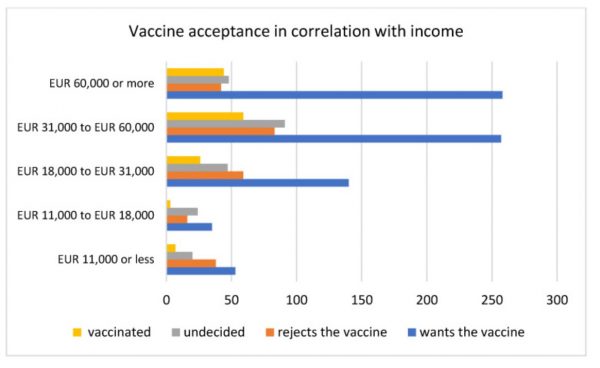Austria’s plan to fine the unvaccinated was introduced to force an uptake in vaccine acceptance; however, recent data suggests the initiative has actually had the opposite effect.
The country is the first in Europe to make Coronavirus Disease 19 (COVID-19) vaccination mandatory. The law, first introduced in November of 2021, recently came into effect on Feb. 5.
Under the mandate, every legal adult has to vaccinate on penalty of fines ranging from €600 to €3,600.
Yet, while the law was proposed to encourage vaccination efforts, it appears to be showing signs of having the opposite effect. Austria’s largest newspaper Kronen Zeitung, also known as the Krone, recently reported on vaccination data they requested and received from the city councilor for health in Vienna.
The translated report notes that, contrary to expectations, Austria saw a surprising drop in vaccination rates, rather than a positive trend, on the day after mandates were imposed, with vaccine acceptance remaining on the decline ever since.
Success
You are now signed up for our newsletter
Success
Check your email to complete sign up
The Krone also reported that while Austrians are still getting vaccinated, the majority of injections delivered are boosters rather than first shots.
As of Feb. 16, via Our World in Data, the percentage of Austrians who have received their first shot between before and after the mandate has risen from 76.0% to 76.1%; the mandatory vaccination edicts generated a miniscule 0.1% change.
Taxing the unvaxxed: a mixed result
The impulse to fine Austrians for not complying with central government edicts may have been spurred by the notable correlation between income and vaccine acceptance, as Austrians with a lower income are less likely to accept COVID-19 vaccination.
A study published in the National Institute for Biotechnology Information in July of 2021 found that higher-income Austrians show higher rates of vaccine uptake. Specifically, Austrians with an annual income above €31,000 showcased the highest predisposition towards vaccine acceptance, while those with an annual income of €18,000 or lower were less likely to want the vaccine.

Austria’s mandate nonetheless remains valid through January of 2024, and can be enacted up to four times, making the highest annual fine a small fortune of €14,400.
The only exemptions offered under the law are pregnant women, people who cannot be vaccinated due to health reasons, and those who have recovered from an infection within the previous 180 days.
Mixed messaging
On Feb. 16, the Government of Austria announced plans to drop most pandemic restrictions by March 5, a decision that appears surprisingly dissonant amidst the prevailing mandatory vaccination narrative. BBC reports that the decision was made after the Omicron variant did not lead to a surge in hospital infections.
Austria has been struggling with dissent from citizens over COVID mandates, recently banning trucker occupation protests in a preemptive strike against the positive response to the Freedom Convoy in Canada.
Notably, as the vaccination rate in Austria has risen, so has the case rate, the most recent peak being 43,053 cases on Jan. 27 according to Worldometers.
Although the nation’s vaccine mandate is already in effect, financial penalties have not been enforced, and will not be until at least March 16, a deadline that gives the government time to retract its measures in case of citizen backlash.
In other regions, plans to fine the unvaccinated have been reversed in the past because of public response. Earlier in the year, Canadian province Quebec withdrew their plan of taxing unvaccinated citizens after the idea proved unpopular.
Whether or not Austria’s mandatory vaccination policies will encourage citizens to vaccinate—and whether the government chooses to keep the mandates in place—will influence how the country continues to manage its pandemic response.
However, if the data thus far showcases a meaningful trend, it appears that unvaccinated Austrians are not willing to budge.

















